World Humanitarian Day: UAE a role model in integrating climate action with humanitarian work
This special day reminds us of the importance of working for our environment, our future

Our planet continues to send harsh messages to warn us of the dangers of excessive utilisation of natural resources and motivate us to unite to ensure the sustainability of life. During the past few months, the entire world witnessed a sharp exacerbation of climate change repercussions, including unprecedented heatwaves, floods, forest fires, and expectations of a possible tsunami.
In a strongly worded statement in the Summary for Policymakers of its Special Report on Global Warming of 1.5°C, the UN’s Intergovernmental Panel on Climate Change (IPCC) highlighted the increasing frequency and intensity of extreme weather events.
The Panel also expects that the continued presence of greenhouse gas (GHG) emissions in the atmosphere will speed up the temperature hike during the next decade, and that sea levels could rise by nearly two meters by the end of this century.
It also noted that concerted global endeavours to scale up and accelerate climate action and reduce GHG emissions to stabilise the temperature increase are our only hope for saving humankind and preserving the Earth for future generations.
Owing to the vision and directives of its wise leadership, the UAE has emerged as a global model of humanitarian assistance, especially in times of crises.

In the past year, a person was forced every second to leave their home due to conflicts or natural disasters caused by climate change, bringing the total number of new displacements in 2020 to 40.5 million, according to a report by the Internal Displacement Monitoring Centre (IMDC).
The biggest problem is that the impacts of climate change will not stop at high temperatures or heavy rains and floods, from which people can be sheltered, but will also affect one of the most basic human needs — food.
According to a global report on food crises in 2020, extreme climate phenomena lead to the rise of poverty and lack of food security. In 2019, 34 million people suffered from severe weather-induced food insecurity — a hike of 17 per cent on 2018.
Countries prone to natural disasters
These numbers are expected to increase, as more than 80 per cent of the people who are the most exposed to food insecurity live in countries that are prone to natural disasters.
The IPCC report was issued on Aug. 9, just a few days before World Humanitarian Day, celebrated on Aug. 19 every year. This is a reminder that our ability to face the greatest threat to the future of our planet depends on humanitarian work that includes two main dimensions — rapid action to reduce the causes of climate change, and helping countries and regions recover from and adapt to the repercussions of climate change.
Owing to the vision and directives of its wise leadership, the UAE has emerged as a global model of humanitarian assistance, especially in times of crises. In 2018, the nation provided more than $7.8 billion in humanitarian aid to 42 countries.
In the past few months alone, the UAE has supported multiple nations affected by natural disasters and the negative impacts of climate change. These include Malaysia that has suffered from floods, the Democratic Republic of the Congo that was hit by multiple earthquakes just three days after a deadly volcanic eruption, and Greece that is currently plagued by devastating forest fires.
The UAE’s pioneering model of global humanitarian work incorporates the comprehensive requirements of climate action. In addition to helping them recover from natural disasters, the nation assists beneficiary countries in strengthening their climate change adaptation capabilities.
The UAE has provided more than $1 billion in development aid to advance the deployment of clean energy solutions in 70 countries. The country has also launched the US$350 million International Renewable Energy Agency (IRENA)/Abu Dhabi Fund for Development (ADFD) Project Facility, as well as the UAE-Pacific Partnership Fund and the UAE-Caribbean Renewable Energy Fund, valued at $50 million each.
To develop a region-specific model of climate action, it established the UAE Climate Change Research Network (CCRN), an advanced research platform for climate science.
Furthermore, the country announced its bid to host the 28th Conference of the Parties to the United Nations Framework Convention on Climate Change (COP28) in 2023.
The UAE’s humanitarian and climate efforts in the past decades align with its leadership’s vision for building a better future for all. Following this approach, the international community must come together to ensure the continuity of life on Earth.
This World Humanitarian Day presents an ideal opportunity to highlight the importance of working for our environment, our planet, and our future.
Dr Abdullah Belhaif Al Nuaimi is the UAE Minister of Climate Change and Environment
Sign up for the Daily Briefing
Get the latest news and updates straight to your inbox








